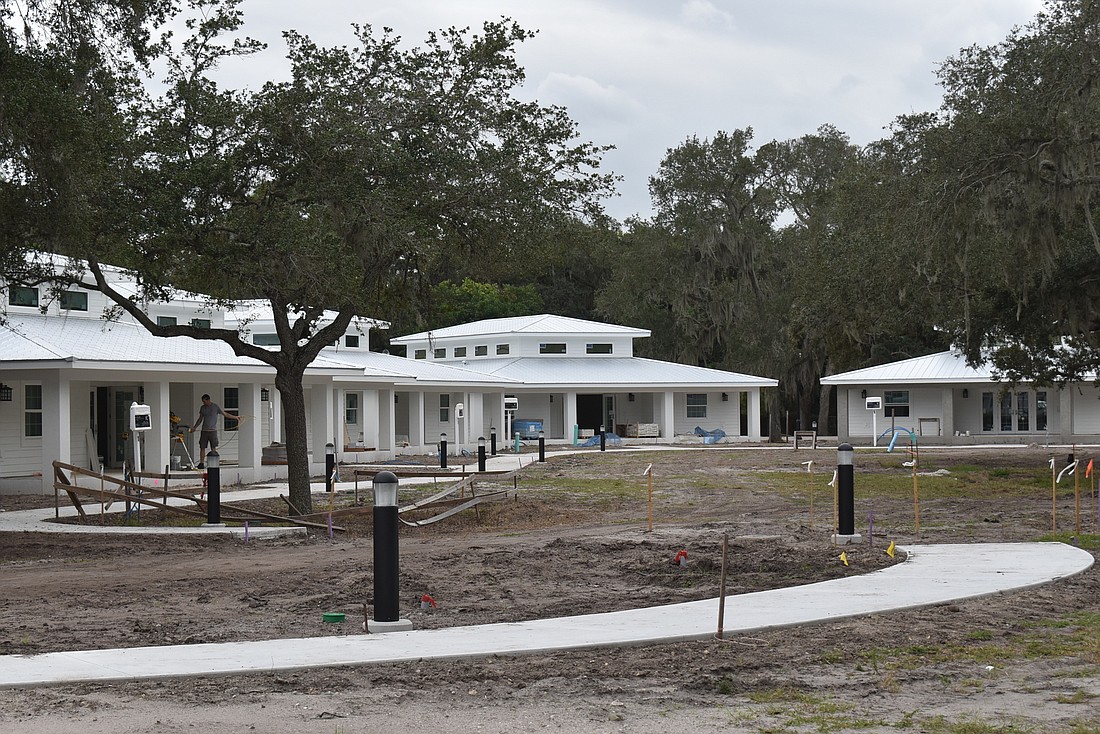- April 25, 2024
-
-
Loading

Loading

On 17th Street in Sarasota, there will soon be a place where nothing happens unless it improves the life of an abused child.
All Star Children’s Foundation, led by Graci and Dennis McGillicuddy, is a local foundation focused on abused and foster children. The foundation has been in existence since the mid-2000s, but the McGillicuddys began work on their overall goal about two years ago. The Campus of Hope and Healing will feature five homes for foster children, a clinical partnership with Johns Hopkins and various therapeutic outlets.
“Everything here is 100% related to healing the lives of children,” McGillicuddy said. “Children don’t come with instructions, so we’re going to give them instructions.”
The foundation operates on the principle of “trauma-informed care,” which means addressing adverse childhood experiences and responding to them in a healthy way. A big component of TIC is creating a healing environment, and the campus aims to create such a place.
“You can’t believe how bright and beautiful it is in here,” McGillicuddy said when walking into one of the homes under construction on the Campus of Hope and Healing. “Children who have experienced trauma need light to heal. We want to put light in that life of darkness.”
All Star is embarking on a journey to create a facility to help children process their trauma while they’re young, so they can move past it later in life. They have partnered with Johns Hopkins All Children’s Hospital to develop a clinic to treat abused children and work to reunite families when possible.
“We're going to be working with the families and their school teachers, everybody that touches this child, we will work with so that once he leaves here, this passage will be seamless,” McGillicuddy said.
Music and art therapy are two components on the second floor of the campus' main building. In the Johns Hopkins wing, there will also be child-parent intervention therapy, where therapists will be able to watch an interaction between a parent and child through a one-way mirror and coach them through it via an earpiece.
“We all raise our kids the way we were raised, and that’s why there’s that cycle of child abuse,” McGillicuddy said. “The parents don’t realize what they’re doing is not right.”
The foundation has been working with and training about 74 local foster parents in helping kids through trauma-informed care before the campus is operational. They hired a clinical director and three clinicians and are looking for a fourth. All Star is already seeing 45 kids and families to begin therapy.
“We've been really, really busy doing stuff because when we move into the building, we didn't want to start from scratch,” McGillicuddy said. “We wanted to come in here and be operational and just take off.”
Behind the main building where the clinic, therapy rooms, children’s boutique and offices are is a path that links the houses that will become homes to foster children parented by people trained by All Star, along with a clubhouse, playground, schoolroom and outdoor movie space. All Star Children’s Foundation is licensed to house five children in each home, McGillicuddy said, but they can get waivers for more to keep siblings together.
“What we're doing here can absolutely have the ripple effect because of the research that we're doing and the evidence-based model,” McGillicuddy said. “What we're doing here can be done anywhere. Really, the heart and soul of what we're doing is in our foster home.”
McGillicuddy’s goal is not just to help the approximately 1,500 foster children in the Sarasota area. She wants to begin the transformation of the foster care system in America by helping bring trauma-informed care to the forefront of child healthcare.
“You have these really good-intentioned people that want to be foster parents, but then they get these kids that are reactive, and they don't know how to deal with them, so they just yank them out and then the children get moved two or three, four times … and then they develop all kinds of psychological problems as a result of that,” McGillicuddy said.
Like a broken bone, the mental effects of trauma can be seen on the brain, according to Johns Hopkins’ research. Children who have been abused are constantly in fight, flight or freeze mode and their bodies produce a lot of the stress hormone cortisol, which can lead to a weakened immune system. Therapy and trauma-informed care can help rework the brain to lead to healthier responses to trauma.
“With our foster parents, instead of saying, ‘What's wrong with you?’, they say, ‘What happened to you?’” McGillicuddy said. “They (the kids) come to them with an invisible suitcase, and so it's up to that foster parent to find out what's in the invisible suitcase.”
Everyone at All Star has become trained in trauma-informed care to create a holistic environment across the campus. The partnership with Johns Hopkins facilitates cutting-edge therapy and scientific methods into children’s care. Dr. Kristin Hoffman, a psychologist from Johns Hopkins All Children’s Hospital, is aiding the foundation in protocols of care.
“Between what we're doing in foster care and the research that we're doing, we will absolutely transform the foster care system and make this a safer and better world for our children,” said chief development officer Stephen Fancher. “The goal is to create the gold standard in foster care. We know it starts with trauma informed care.”